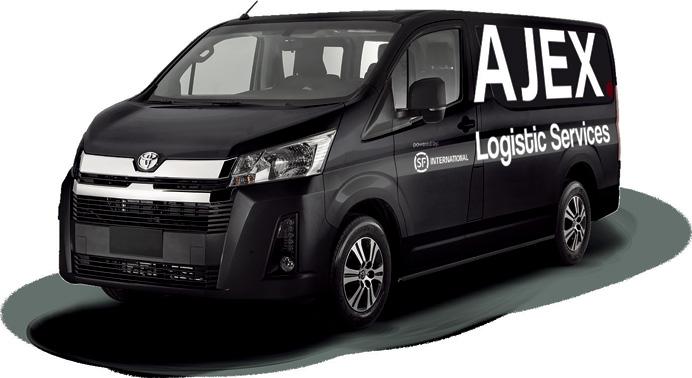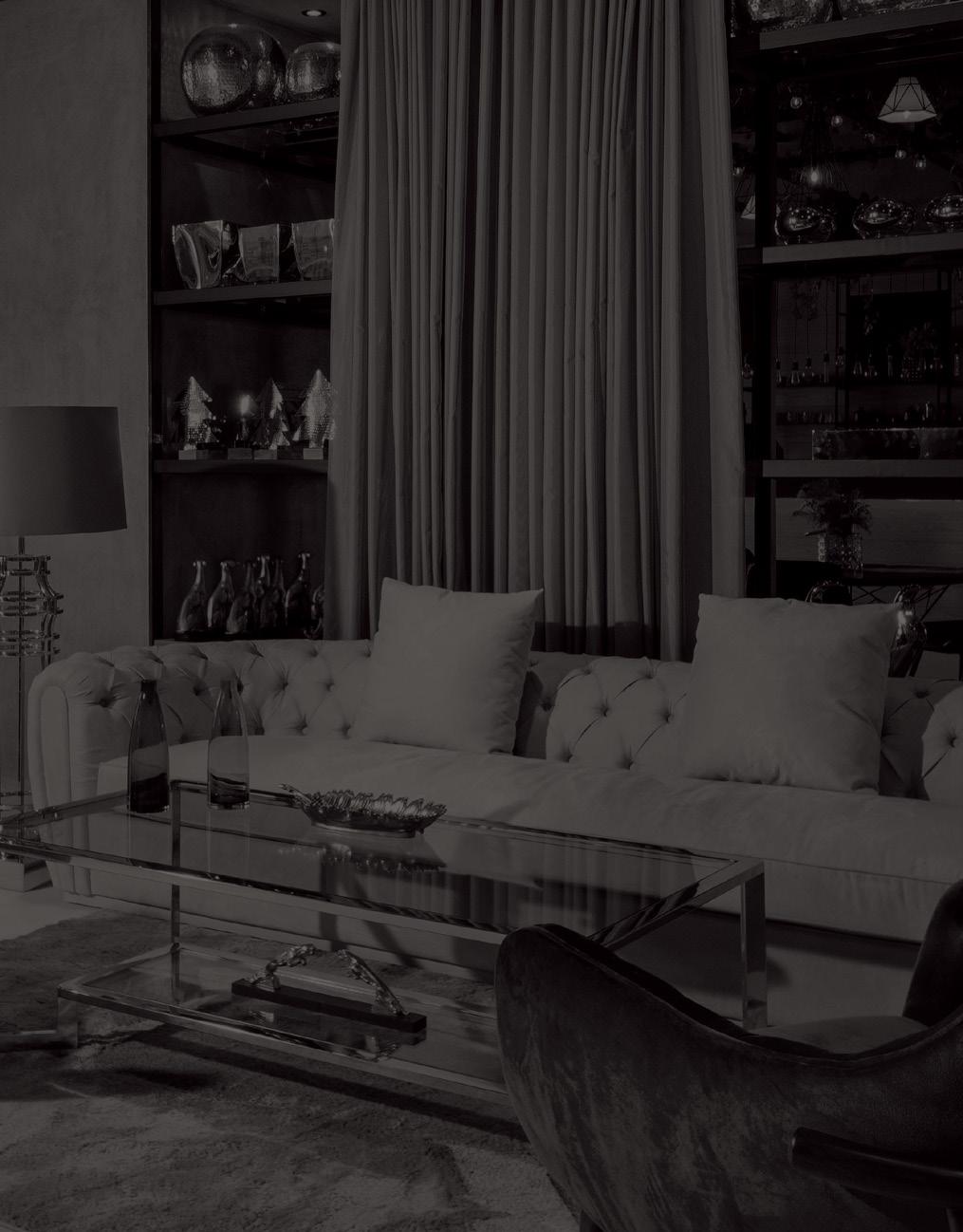
23 minute read
I Baros Maldives
By Claudine Coletti
• HOTEL REVIEW •
Baros Maldives
The sparkling azure atolls of the Maldives are the touchstone of luxury romance for starryeyed lovers and honeymooners—but that is not all they are. These secluded islands are also a perfect spot for solo travelers to pause, explore, and recuperate.
A
As a solo traveler, I know the many benefits of taking some time away to disconnect and take care of yourself. However, when I do get a chance to head somewhere new, I find myself gravitating towards city breaks, with long lists of places to go, things to do, and distractions to get lost in. So, when the opportunity arose to experience the Maldives, my expectations were mixed. I thought these paradise islands were deep into couple territory, solely designed for lovers looking for romance, not single sightseers looking for alone time? I was wrong.
The Maldives are a collection of 1,192 coral islands scattered across 26 natural coral atolls. They officially cover 90,000 square km, with the sea accounting for 99% of this area. Less than 200 of the islands are inhabited, and more than 100 of these have been turned into resorts for tourism. Each resort is rich with flourishing palm trees and encircled by clear lagoons, and most have a jetty of water villas protruding from the beach. From the air, these lush islands look like green and turquoise paint droplets randomly splashed across the otherwise deep blue Indian Ocean. But while at first glance they may appear very similar, every resort has its own personality.
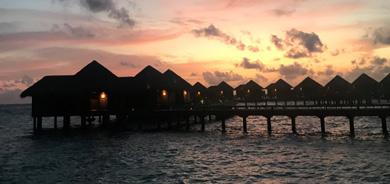
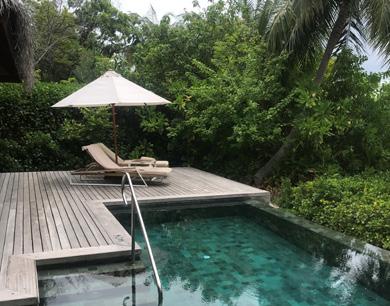

Personally, I was looking for somewhere luxurious but unpretentious to disappear for a while. So, I headed to Baros, where the vibe is very much about understated tranquillity. The island is one of the smallest and oldest resorts in the Maldives. Just 384m x 303m in size, it was the third Maldivian island to open to tourists in the 1970s. Of course, it has had a couple of major renovations since then to modernize and expand, but the setting still feels very simple and serene. Just what I was looking for.
First impressions: When I arrive by speedboat from Malé, it is very early morning, and the only people I see are the team that greets me warmly and shows me to the welcome pavilion before taking me to my villa. It’s my first time staying on a desert island, and coming from a bustling city, the abundant natural greenery and ocean air are immediately refreshing. I also appreciate the calmness. Baros is intentionally subtle in its style. There are no gimmicks here; the hospitality genuinely feels sincere.
The environment provides peace and seclusion, while the Baros team quietly looks after everything else in the background. This is aided by the villa hosts, who are on hand to assist you, cater to any requirements, and generally help in any way they can. I value this particularly highly as a solo traveler. I feel very safe knowing that there’s a friendly expert just a message away if I need them. All the staff are very welcoming. They all live on the island, and as a guest you very much feel that you are amongst a community. Accommodation: At the center of Baros is vibrant tropical vegetation made up of towering palm trees, wild bushes, and indigenous flowers that envelop you as you walk along the main inner pathway circling the island. Walking is the only way to get around, but it is possible to stroll across the whole place in about 10mins. The beach villas are set around the edge of the island, almost hidden amidst the greenery, while the water villas stretch out into the lagoon. I’m lucky enough to experience both during my stay. This is apparently not uncommon, with many guests choosing to spend time in each.
The Baros Suite beach villas consist of a large bedroom with a king-size bed, a separate living room, a bathroom stocked with L’Occitane products, an outdoor terrace and shower, and a private pool with built-in jacuzzi and beach access—the suite I stay in is bigger than my apartment at home. With wooden features and light-colored décor that blends in with the natural surroundings, it feels both comfortable and elegant. However, I spend most of my time outside. The pool is big enough to swim or just float around, and a sheltered swing seat is the perfect place to curl up with a book. There are also sun-loungers nestled amongst the bushes marking out a pathway to the beach and the lagoon, with easy access to the house reef for snorkellers. Even outside of the water, nature features heavily when you’re lounging around a tropical island. Huge fruit bats soar among the trees overhead, while smaller birds confidentially scuttle across the terrace for a dip in the pool, and bees hover

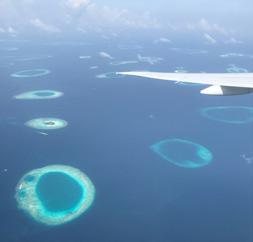
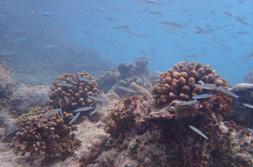
in and out of the bushes. While you are not overlooked, you do have neighbors, and the beach is accessible to all villa residents. However, it is very easy to stay concealed if you don’t want to bump into anybody.
The water villas offer a different style of solitude. These structures have become iconic and well-recognized as epitomizing the Maldives. Whereas the beach villas cocoon you in green, the water villas maroon you in sapphire— looking out to the ocean from the deck of my over-water hideaway, I counted six different shades of blue. The villa itself is modestly sized but well fitted-out, with a kingsize bed, pop-up TV, sofa, private pool and terrace, and a bathroom looking out onto the pool and stocked with Aqua Di Palma products. Outside there are also steps leading directly into the ocean. The lagoon around the water villas is not a premium spot for snorkeling, with most of the underwater action happening around the reef that circles the island; however, it is safe to swim, and you do still get some curious visitors. While lounging on the daybed, I spotted a couple of blacktip reef sharks exploring the area, and on one occasion a huge reef manta ray nonchalantly glided by. Again, you do have neighbors, and everyone can access the sea, but aside from the odd person swimming past, you can enjoy your privacy.
One thing to note is that the water villas are, of course, completely open to the elements, and therefore bad weather would likely keep you indoors. The one bout of heavy rainfall and wind during my trip came when I was staying at the beach villa, which was sheltered enough that I was able to sit on the swing seat outside and safely enjoy the storm. Activities: Whereas every island in the Maldives technically has an underlying coral reef, not all of them have one that can be easily and safely accessed from the beach within swimming distance—those that do are said to have a house reef. Baros has a 300m-long house reef. This is partially marked out by a man-made wavebreaking wall that protects the beach from potentially damaging surfs as they hit the reef drop-off. The wall is dotted with gaps so that swimmers can access the reef and the wider ocean.
Snorkeling equipment can be picked up from the dive center, and on my first adventure I’m shown the ropes by an instructor. We access the lagoon from a stretch of beach near the bar and swim through the wall, which we then follow around the length of the island up to the water villas. It takes about an hour, and along the way we see a myriad of marine life—the reef is thriving. Blacktip reef sharks are a common sight, and while I admit that the first time I spotted something shark-shaped my heart skipped, it quickly became apparent that they care very little about the humans floating around their territory—and they are hypnotizing to watch. I also saw Pana the turtle—a regular Baros resident— munching on the coral, and I spotted a baby nursing shark hiding in the sand.
Although not (yet) PADI-certified, I was also able to book an assisted scuba-dive as part of the dive center’s Discover Scuba-Diving package. While as a novice you cannot dive further than 12ft, this is far enough to explore the reef dropoff and get up close to the marine life. For expert divers, excursions can be tailored, with ship-wrecks and deeper water voyages available.
On top of the water, Baros offers a variety of water sports, as well as cruises for fishing, dolphinspotting, or sunset watching. These are understandably weather dependant and cannot go ahead in windy conditions, which you can expect sporadically between May and October. As I’m there in August, conditions are warm but temperamental, often changing between bright sunshine and moody clouds.
If land-based exercise is your thing, there is a fully-equipped gym, and I even spotted some guests jogging around the island while I sat at Sails Bar enjoying a drink. For morning people, there is daily 7 am yoga on the deck of the Lighthouse Restaurant with a qualified instructor able to tailor the movements to suit beginners or experts.
And let’s not forget that relaxing is an activity. Arguably the main one on this type of holiday. The Spa is the perfect place to unwind and let someone else soothe your troubles away. I had a signature massage, which was an hour of total peace. After filling out a form for the therapist about what areas to focus on and my preferred pressure, I simply lay down and drifted off.
Dining: Despite its small size, Baros houses three restaurants located on the edge of the lagoon. They each offer a choice of over-water seating for alfresco dining, and they each have their own unique style. The friendly chefs and waiters remember you by name and are on hand to offer recommendations or tell you more about any of the dishes according to your preferences. As a pescatarian I was in my element—Maldivian cuisine unsurprisingly features a lot of fresh fish and Asian-style dishes. Although I didn’t try them, there were also plenty of meat options and vegetation selections.
The Lime restaurant hosts a vast breakfast every morning, as well as lunch and dinner, and is home to the resort’s infinity pool, which is open to all guests. This also attracts other visitors—while enjoying my coffee, I watched as herons drifted in to walk along the water’s edge, have a wash, and contemplate their own breakfasts. One morning I treated myself to a floating breakfast, whereby your pre-ordered meal is delivered to your villa at a specified time and served to you in the pool in a floating basket. It’s wildly impractical, but the food is lovely, and it makes for great photos. I had most of my meals at Cayenne, often eating myself into a food coma as I worked my way through a menu full of seafood, sauces, and side dishes. One afternoon I was able to have a teppanyaki lunch freshly cooked for me by a charismatic private chef, who literally juggled with his knives while preparing my feast as I sat at the restaurant’s live cooking station. Another night the restaurant laid out a Maldivian buffet for guests, with an immense selection of sushi, curries, and salads. The sashimi was so fresh it was cut straight from a whole tuna laid out on ice. While sitting on one of the tables on the wooden deck at night, there is the added bonus of being able to watch a throng of reef sharks darting around the restaurant, attracted by the lights. The Lighthouse Restaurant is the island’s signature fine-dining experience. Sitting out on a jetty, the building itself is a memorable feature of Baros Island, with a distinctive cone-like sail roof, a circular structure with outdoor seating, and a lounge on the upper deck with live music. The menu is extensive. I ordered the lobster bisque—one of the restaurant’s most famous dishes. Minutes after ordering, a chef wheeled over a mobile cooking station and began preparing the bisque with fresh ingredients at my table. Entertaining and delicious.
Final thoughts: If you’re traveling alone and looking for something a bit special, don’t be put off by the Maldives’ romantic reputation. Pick the right island, and you will find a peaceful getaway, an opportunity to unplug, and a fascinating environment to explore. If you get the chance to treat yourself, take it.




Business Models Transformed Panelists
Forbes Middle East’s Family Business Summit 2021
Forbes Middle East hosted its first Family Business Summit virtually in August. It was watched by over 1,000 attendees from across the Middle East, Europe, and Africa.
BY SANA TAHIR
Family-run organizations continue to play a vital role in supporting the region’s economy and helping it evolve as it positions itself as a global hub. Forbes Middle East’s digital Family Business Summit gathered some of the region’s most successful family business leaders who have been driving the transformation of their businesses to explore some of the key issues affecting them.
Discussions during the summit centered around the postpandemic outlook, digital transformation, business model transformation, startup investing, wealth management, and whether or not family businesses should go public.
Platinum Partner Gold Partner Knowledge Partner


Going Public Panelists
Going Public
For the discussion “Going Public, Should You?” the panel discussed the advantages and challenges encountered by family businesses when going public. Moderated by Peter Englisch, a Senior Partner and Shareholder at PwC Germany, the three speakers were: Mohamed Fahmi, Co-Head of Investment Banking at EFG Hermes; Talal Ajlan AlAjlan, CEO of the National Center for Family Business; and Ahmad AR. BinDawood, CEO of BinDawood Holding.
Fahmi clarified that the process of going public for family businesses is the same as the one followed by any enterprise. He explained that he had witnessed numerous family businesses that were being run like public market enterprises, and investors feel more secure investing in family businesses that have multiple generations of family members dedicated to growing its success. Therefore, the idea that family members lose influence after their businesses become public is negated, because the level of family involvement is a factor that initially attracts investors and prompts them into making offers.
With regards to the prerequisites for going public, he pointed out the need for strong internal decisionmaking processes and high-quality management teams. Some other prerequisites were highlighted by BinDawood, which included having a carefully planned strategy for going public and tracing the company’s future in the public market. This is necessary to ensure that investors understand the business, its operations, and its long-term goals.
As for the motivation behind and advantages of going public, BinDawood highlighted the importance of sustainability and the preservation of the wealth that is built over generations within a family business. Not only does an IPO guarantee the success of a business in the long run, but it also attracts talent, which goes on to form an essential part of the management and perpetuates the cycle of sustainability. In addition to this, with a business going public, corporate governance steps in to make the decision-making processes faster, more disciplined, and efficient, which proves to be beneficial in the future.
However, even with these advantages, some family businesses are reluctant to consider going public due to concerns around the family’s loss of control and influence, as power would be devolved to external shareholders and employees coming from outside of the family. According to AlAjlan, although an IPO is seen as a solution for implementing sustainability, promoting growth, and acquiring funding, family businesses are reluctant to pursue one as it may lead to disputes amongst family members over valuations, ownership, and the overall decision to go public.
Family businesses can benefit greatly by transitioning into the public sector, but in order to go public, they need to be educated about the procedures of pursuing public listings. AlAjlan elaborated on how his NGO provides this service to family businesses, whereby they train them to understand the processes of going public, connect them with listing teams and the capital market authority, and help them devise effective long-term strategies for presenting to investors. The idea that family businesses can significantly benefit by going public
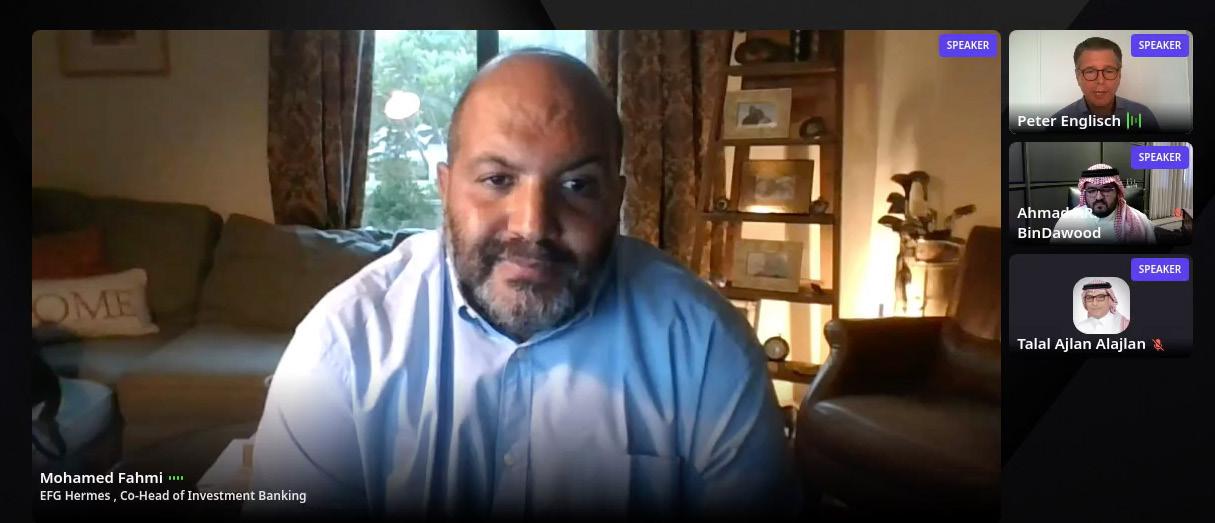
Investing In Startups Panelists
was reinforced by Fahmi, along with the fact that the process for going public is gradually becoming easier as regulators are changing laws to provide family businesses with better access to markets and international standard IPOs.
Fahmi was asked what scale of IPOs he could foresee in the region. “The outlook is quite positive. This year has been busy between Saudi Arabia, the U.A.E., and Egypt, we have seen some decent offerings come to market,” he responded. “I think over the next 12–18 months, we will see a very good flow of equity offerings in the region. We are already seeing a lot of family businesses looking to go public.”

Business Models Transformed
On a quest to understand how family businesses have fared in the transformation era, the “Industry 4.0: Business Models Transformed” panel comprised of: Navin M. Valrani, Vice Chairman and Managing Director of the Al Shirawi Group; Ayman Maamoun Tamer, Chairman and Managing Partner at the Tamer Group; Rashid Khalaf Al Habtoor, CEO and President of Al Habtoor Trading Enterprises; and Dr Sheikha Aisha, Chairperson and Founder of the Al Faleh Group.
Moderated by Anurag Bajpai, the Lower Gulf Head of Consumer and Retail and LG Leader at KPMG Private Enterprise, the panel discussed how the pandemic acted as a catalyst for change in the operating models employed by businesses. The temporary changes put in place may now become permanent as the world settles into the new normal. Dr Aisha noted how the adoption of newer technologies had facilitated a seamless shift to the remote working model and that this model would continue to exist in some capacity even in the foretold post-pandemic era.
The outbreak of the pandemic accelerated the pace at which family businesses were embracing digitization and adopting technological solutions. Prepandemic, the adoption process had been slow. Embarking on a digital transformation journey meant greater costs and increased security concerns and family businesses were reluctant to confront these issues. During the pandemic, those that had already begun to digitize their operations had to quicken the pace at which they were implementing technological changes, while others had to quickly follow suit to be able to adapt to the emerging reality of contactless interactions and digital communications.
As part of the transformation process, family businesses have reemphasized the role of employees and the importance of seeking and retaining talent. For instance, Al Habtoor talked about the importance of reassigning roles and training employees to be multi-purpose individuals, which would increase their productivity and the overall efficiency of their business model.
Investing In Startups
The business landscape in MENA has been greatly altered by the emergence and proliferation of startups. While they are often seen as a source of disruption in the market, startups also present family businesses with an opportunity to diversify their portfolios and expand their businesses by investing in them. The “Betting Big on the Future: Investing In Startups” panel was hosted by Ahmed Youssef, a Senior Partner at McKinsey and Company. Speakers were: Mohamed Mansour,
A Private Wealth Perspective Panelists
Founder and Chairman at Man Capital; Hassan Jameel, Deputy President and Vice Chairman at Abdul Latif Jameel; H.E. Dr Nabeel Koshak, CEO and Board Member of Saudi Venture Capital Company (SVC); Masaood Rahma, a Board Member of the AL Masaood Group; and Makarem S. Batterjee, President and Vice Chairman at the Bait Al Batterjee Group.
The region has witnessed a shift from traditional economies to ones newer and more innovative, with tech startups at the forefront. Jameel suggested that family business groups could adapt to this change and benefit by making strategic investments in startups that would be complementary or supplementary additions to their well-established businesses. These investments, according to him, would also be strategic in the way that they would allow old family businesses to learn from newer companies. Batterjee reinforced this point by highlighting the importance of investing in startups that are related to one’s core business. This would not only add value to the existing business but would also be a relatively less risky investment to make.
With regards to startup equity, Dr Koshak pointed out that more family businesses are now working towards investing in this new asset class, despite the risks associated with it. He explained this trend by stating that such investments are mutually beneficial for startups and family offices. While startups gain funding and expert guidance, family businesses benefit by acquiring companies that can help them innovate and digitize their operations and give them a competitive advantage over rival businesses.

A Private Wealth Perspective
The “Sustaining Capital: A Private Wealth Perspective” panel focused on the changing investment landscape, the role of environmental and social governance (ESG) policies in propelling this change, and the importance of the next generation in carrying forward the legacy of family businesses while aligning themselves with global sustainability goals and maintaining profits. Moderated by Walid Chiniara, Partner at Global Family Solutions Deloitte, the panel consisted of: Maha Al Fahim, Board Member at Eshraq Investments; Omar Kutayba Yusuf Alghanim, Chairman of the Family Business Council Gulf; and Farah Foustok, CEO at Lazard Gulf Ltd.
Alghanim highlighted the need for family businesses to integrate ESG into their own policies and operating models. Al Fahim emphasized that ESG metrics provide non-accounting information that is generally overlooked when determining valuations. By analyzing these metrics, family businesses can make smart investments in industries that are bound to out-perform markets after having integrated ESG policies. She also talked about the importance of considering soft metrics, such as women’s representation and board diversity, because they have a proven and positive impact on financial ROIs in the long run.
With many countries shifting their attention to contributing towards non-oil industries, there is a greater opportunity for family businesses to invest in more sustainable sectors. For example, investing in the education sector would not only allow these businesses to fulfill their objective of giving back to the
Looking Ahead Panelists
community and impelling societal change, but will also enable them to educate upcoming generations, by virtue of which they will be investing in the most valuable asset in the economy: people.
Foustok steered the discussion towards the concepts of sustainable financing and impact investment by emphasizing the need for family offices to actively engage with the companies that they invest in. was She presented materiality mapping as an effective way of ensuring that companies abide by ESG policies and regulate their activities in a way that is sustainable, inclusive, and ecofriendly. Mapping elements like air quality, waste management, and diversity was essential not just for assessing the environmental and social impact that these companies’ operations were generating, but also for leveraging the power to call for change within these companies.
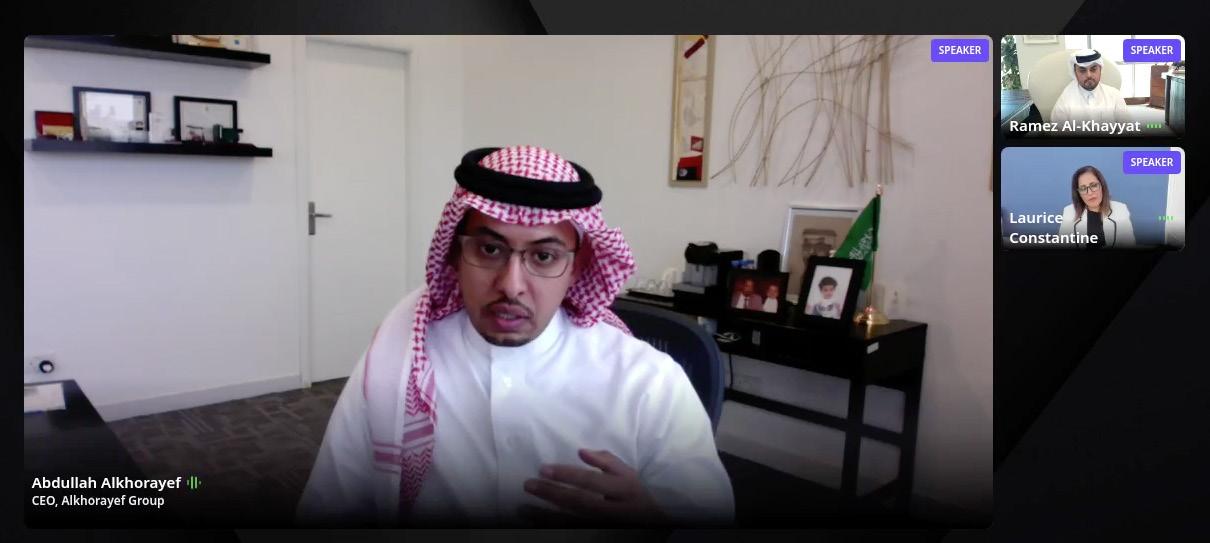
Looking Ahead - What Does The Next Decade Look Like?
The session “Business Outlook for the Next Decade” was hosted by Laurice Constantine, Digital Managing Editor at Forbes Middle East. She was joined by Abdullah Al-Khorayef, CEO of the Al-Khorayef Group, and Ramez Al-Khayyat, CEO and Vice Chairman of the Power International Holding Group.
Al-Khorayef pointed out that bigger companies have a long credit history with banks, and that no obstacles will hider these companies if their credit rating is high, but that his group’s clients, especially abroad, were faced by such funding problems.”Today, we are witnessing many new funding solutions that help a lot in funding operations,” he added. “The digital system adopted in Saudi Arabia helped clients secure quick funding, in addition to the kingdom’s establishment of the Saudi Export and Import Bank, which was a catalyst in securing funding, especially in oil and agriculture.” He stressed that cutting-edge funding tools such as Fintech do not help large groups and are geared towards startups.
Al-Khayyat indicated that contracting companies, especially in Qatar, have achieved significant growth despite the pandemic exceeding 30%, in light of the preparations for Qatar’s 2022 World Cup. “We always have to think out of the box when it comes to funding and expansion plans,” he added. He revealed that his group’s strategy is to list subsidiaries without the parent group, stressing that they are as entrepreneurs focus on innovation, new ideas and concepts. He revealed a reverse acquisition of the subsidiary Elegancia, which will be announced before the end of 2021, with a value of more than one billion dollars. The group is also looking forward to listing UCC, the largest contracting company in Qatar and the third in the Gulf, during 2022.
Regarding introducing external partners, Al-Khorayef pointed out that the market is looking for diversification, but he considers listing of the parent group stock unhealthy, as it entails risks and undermines the group’s focus. He explained that the decision to expand depends on the company’s strategy, and its analysis of the current dynamics. In the same context, Al-Khayyat cited three factors: the company’s strategy over five-years, access to opportunities, and market demand.
• THOUGHTS ON •
108 “I have tried if I could to reach that great THOUGHTS resolution: to be honest without a thought of heaven or hell.” —Sir Thomas Browne “Seldom, very seldom, does complete truth belong to any human disclosure; seldom can it happen that something is not a little disguised or a little mistaken.” —Jane Austen

“Necessity makes an honest man a knave.” —Daniel Defoe
“Sometimes my candor may be difficult for people to hear, but they can trust they know where I stand.” —Lori Garver
“Don’t edit your soul according to the fashion. Rather, follow your most intense obsessions mercilessly.” —Franz Kafka
“Honesty is the best policy, but he who is governed by that maxim is not an honest man.” —Richard Whately
“Anything is better than lies and deceit!” —Leo Tolstoy
Honesty
Khaled Hosseini
“Confidence in what you do is crucial, but that does not mean being delusional. You must always face the truth and then combat the obstacles as they appear.” —Diane von Furstenberg
“That’s the thing about people who mean everything they say. They think everyone else does too.” —Khaled Hosseini “If you do not tell the truth about yourself, you cannot tell it about other people.” —Virginia Woolf
“Nothing is so difficult as not deceiving oneself.” —Ludwig Witt genstein
“In a room where people unanimously maintain a conspiracy of silence, one word of truth sounds like a pistol shot.” —Czesław Miłosz “Integrity means honesty and willingness to fulfill a promise, even at high cost.” —Morris Chang
“Determine early on whether your passion is your true calling, or just a fantasy to get out of your system.” —Tami Zhu
“When people ask, ‘How are you?’ Have the nerve sometimes to answer truthfully.” —Maya Angelou
“Whoever would love life and see good days must keep their tongue from evil and their lips from deceitful speech.” —1 Peter 3:10
SOURCES: RELIGIO MEDICI, BY SIR THOMAS BROWNE; THE KITE RUNNER, BY KHALED HOSSEINI; APOPHTHEGMS, BY RICHARD WHATELY; EMMA, BY JANE AUSTEN; ANNA KARENINA, BY LEO TOLSTOY; LETTER TO MY DAUGHTER, BY MAYA ANGELOU; CULTURE AND VALUE, BY LUDWIG WITTGENSTEIN.
FINAL THOUGHT
“A crooked course is the longest road to take to get anywhere.” —B.C. Forbes

